After the Carlsen-Niemann firestorm, what now?
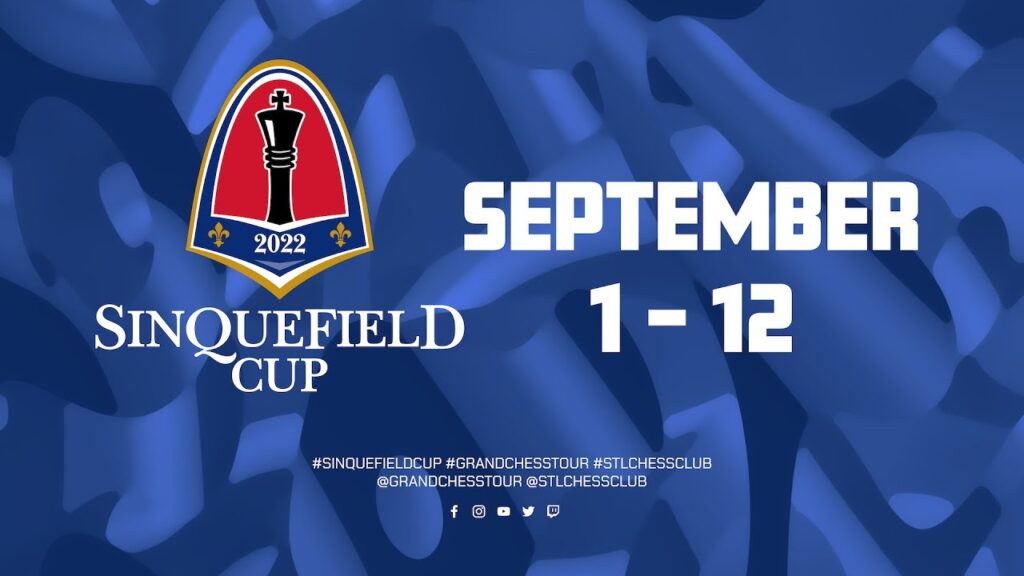
The cheating scandal that dominated the 2022 Sinquefield Cup saw GM Hans Niemann fall into controversial spotlight in his first supertournament. The incident was precipitated by Magnus Carlsen’s withdrawal from the tournament and a tweet that included a reference to cheating. Many commenting on the matter did not understand the tweet and figured it only referred to Carlsen not being able to speak about why he withdrew.
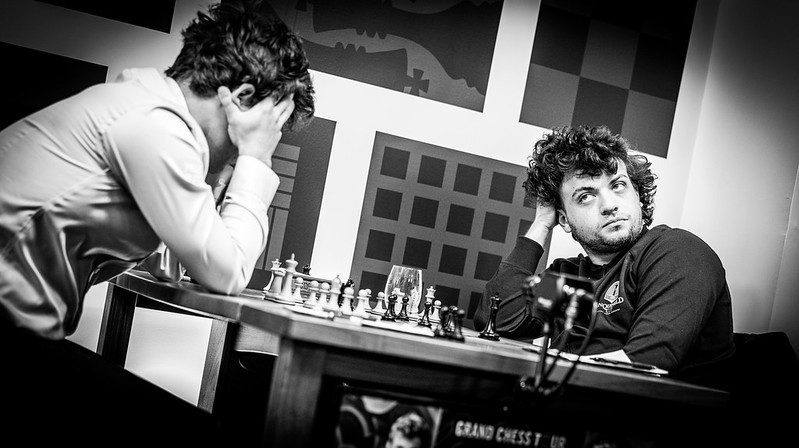
Hans Niemann could not imagine how this game against Magnus Carlsen would change his life. Photo by Lennart Ootes
In actuality, the meme he included insinuated that Niemann was somehow involved in cheating during their game. Jose’ Mourinho was known to have issues with referees and accused them of match-fixing and showing bias against his team. He was suspended and fined. While coaching Chelsea, he famously stated that he prefer not speak. It turned into a viral meme among football fans. Carlsen made no other statement, but he had dropped a bomb on Twitter and left the scene. As the smoke cleared, the chess world was left in chaos.
This resulted in an examination of Niemann’s online background and cheating infractions he committed at chess.com. The chess world was set ablaze with rumor and gossip as they wanted to tie his background to the Carlsen tweet. The incident resulted in millions of comments touching practically every social media platform and every important chess website. Mainstream media also picked up the story and was commented on by no less than Tesla’s Elon Musk.
What Really Happened?
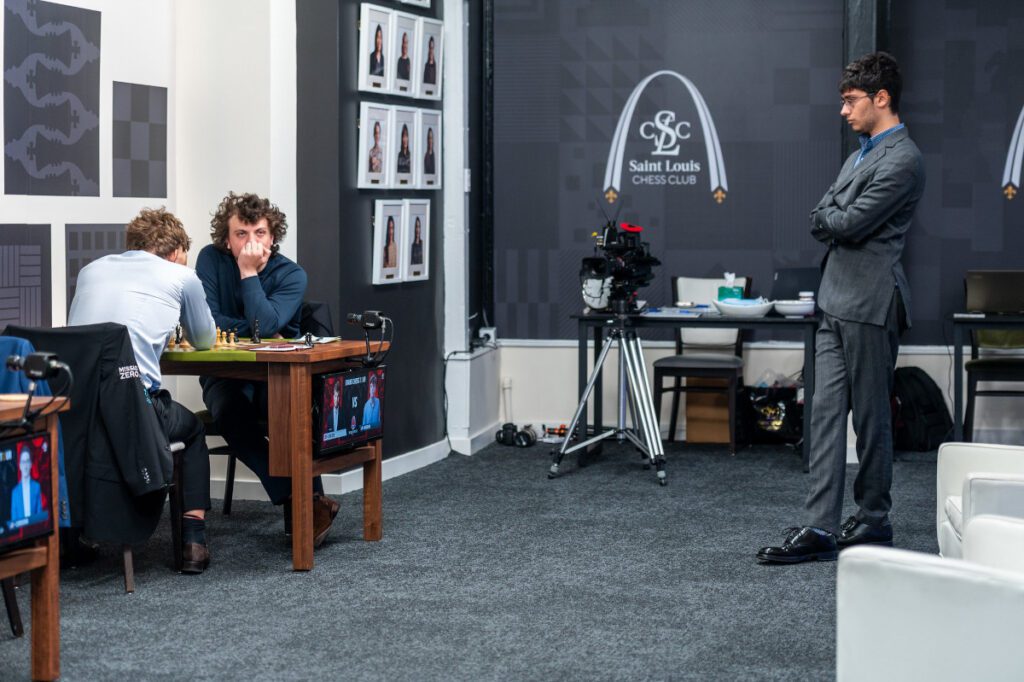
Hans Niemann on his way to beating the world champion as Alireza Firouzja looks on. Photo by Crystal Fuller
On September 4th, Magnus Carlsen played the white pieces against Hans Niemann. They played a couple of weeks earlier at the FTX Crypto Cup and Niemann won the first game of the match. In a classic interview, he delivered a short response about his winning performance… “Chess speaks for itself” and walks away. This became a soundbite picked up by fans and repeated. His interviews raised eyebrows and induced chuckles when stating that he spent $1000 on UberEats. He went on to lose the match 3-1 and failed to earn a match victory in the tournament, but he was an instant sensation.
At the Sinquefield, after drawing with Levon Aronian and beating Shakhriyar Mamedyarov, Niemann was set to face Carlsen. In Carlsen-Niemann, a theoretical battle unfolded at the outset as the game went into an obscure g3 Nimzo. The opening would become important later on in the interview. Many speculated that Niemann obtained Carlsen’s preparation from an unknown source based on an interview given after the game.
In this game, Niemann claimed that he guessed right, but there was nothing unusual about the game. The champion made many critical mistakes and failed to keep the balance. Niemann spoke about these lines in the post-game interview.
Notes by ChessBase.com
Niemann’s Interview after Beating Carlsen
Video by St. Louis Chess Club
All was calm, but the Niemann interview had people buzzing. He had developed a reputation for giving memorable interviews and this one didn’t disappoint. However, it may have upset Carlsen since there were many points that seemed like Niemann was being disrespectful and basking in his glory. Nevertheless, the upset victory sent shockwaves around the world and no one suspected Niemann of any wrongdoing since the game had plenty of flaws.
The next day on September 5th, the bombshell came. Carlsen notified the organizers and Chief Arbiter Chris Bird that he was withdrawing from the tournament. He did not show up for his game against Azerbaijan’s Shakhriyar Mamedyarov and later posted a tweet announcing his withdrawal. There was a particular detail added. He included a video with Jose’ Mourinho stating “I prefer not to speak. If I speak I am in big trouble… and I don’t want to be in big trouble.”
I’ve withdrawn from the tournament. I’ve always enjoyed playing in the @STLChessClub, and hope to be back in the future https://t.co/YFSpl8er3u
— Magnus Carlsen (@MagnusCarlsen) September 5, 2022
The Insinuations
Why did Carlsen withdraw from one of the world’s most prestigious tournaments? The video in the tweet is a Mourinho reference to the referees whom he accused of cheating (match-fixing) in a Premier League match while coaching Chelsea. Hikaru Nakamura was the first to speculate that Carlsen may have thought Niemann cheated.
Video by Hikaru Nakamura (Twitch)
While Carlsen implied it with his tweet, it was the first instance where cheating was directly mentioned. Nakamura showed skepticism that Niemann cheated in the game, but he kept supporting the narrative by pointing out cheating history, the way Hans analyzed at sub-2700 level, and drew a connection to Carlsen’s implied message.
Chess players grabbed the insinuation and ran with it. Reddit exploded and produced a “megathread”. Twitter exploded. Facebook exploded. Countless videos were posted analyzing the controversy. All of the major chess websites ran stories. Finally, mass media picked up the story. Now the focus was on Niemann’s cheating background as opposed to whether he cheated against Carlsen. Thus, the “confirmation bias” was that since Niemann cheated before, then Carlsen must be right in his implied messages that Niemann cheated in their game. Either on September 5th or 6th, chess.com suspended Niemann’s account.
They have decided to completely remove me
from the website.~Niemann referring to chess.com ban
While Nakamura cannot be blamed for Carlsen’s actions, his popular Twitch broadcast to 25,000+ viewers gave the cheating rumor ample fuel. He followed up by doing several Twitch broadcasts focusing on the cheating topic. Meanwhile, fans were questioning everything Niemann did… how he was walking, his facial expressions and, of his accent. GM Eric Hansen of Chessbrah went on Twitch and made a lot of mention about Hans’ level of analysis and his fake accent.
Finally, there was Nakamura’s statement about how fast Niemann rose claiming it was “unprecedented.” What does this imply? It implied that something unnatural or unusual happened. It’s not necessarily true unless things are put into context. Later, others pointed out that Anish Giri, Levon Aronian, and Arjun Erigaisi had made similar jumps. There were also these names in the table below, but notice Niemann’s steep rise between age 17 and 19.
The point Nakamura was making was that in this age range it is highly unlikely to make such a sharp increase. Again you cannot prove a hypothesis by low-level analysis of descriptive statistics. You have to add variables that explain the increase since every subject will have a different improvement trajectory. Hans’ study regimen (12 hours a day), hiring a coach, frequency of play, and type of tournaments may account for a portion of the sharp improvement. Regression analysis may even give an idea of which of these factors have the most impact.
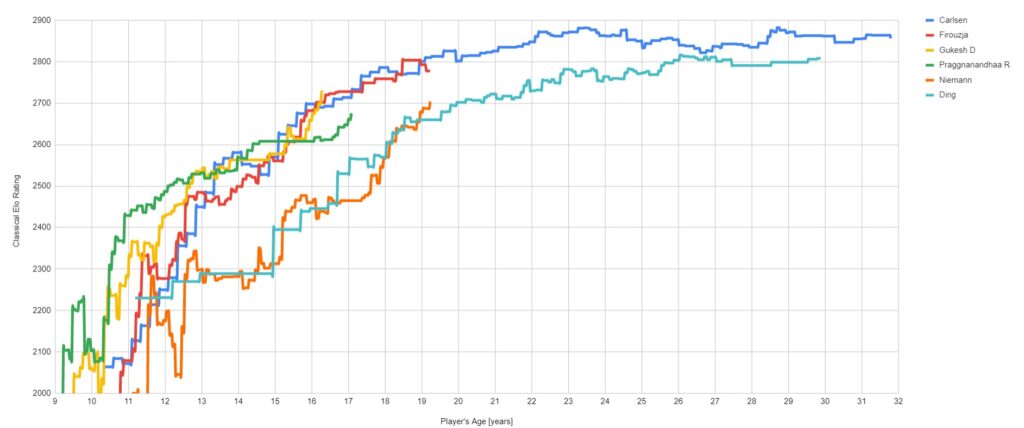
Nevertheless, this is merely a low-level stat and it is hard to draw any inferences from it alone. One would need to control for many factors in the analysis and there is simply not enough data here to draw any conclusions. Niemann had no idea about what was brewing and found out later that evening that his chess.com account suspended. As Niemann was being maligned in the chess world, everyone wondered how he would respond.
Hans Niemann Responds
Extra security measures were instituted for round four onward which would imply that it was due to the cheating accusation. In a post-game interview for round five (September 6th), Niemann addressed the cheating allegation head-on. It is a must-see interview that won him a lot of praise and quieted some detractors. Others were not fully convinced.
Interview with GM Hans Niemann (Cheating Accusation)
Video by CCSCSL
After beating Carlsen, many played on his words “miracle” and suspected that somehow he obtained his preparation. Peter Heine Nielsen has served as his second and it is doubtful that the leak came from him. Which of his associates would take such a risk? In actuality, Carlsen played a game against Wesley So that was not the exact opening, but arrived by transposition. Many wondered how he guessed Carlsen’s opening apart from that he had to prepare against an opponent who has played similar systems before. Grandmaster Nigel Short weighed in…
M, Carlsen – W, So, Kolkata 2019. This is a g3 Nimzo, by transposition. The fact that Hans Niemann could not recall whether this game was played in London, Kolkata or Ouagadougou, is proof of absolutely nothing to my mind. Playing the World Champion is not a a geography quiz. pic.twitter.com/dsKAbMvli9
— Nigel Short (@nigelshortchess) September 6, 2022
Niemann went on the offensive against Nakamura.
Hikaru has thoroughly enjoyed watching all of my interviews and enjoyed criticizing every single detail and making frivolous implications. I’d like to see him watch my entire interview today and see what he has to say.
— Hans Niemann (@HansMokeNiemann) September 6, 2022
The silence of my critics clearly speaks for itself. If there was any real evidence, why not show it? @GMHikaru has continued to completely ignore my interview and is trying to sweep everything under the rug. Is anyone going to take accountability for the damage they’ve done?
— Hans Niemann (@HansMokeNiemann) September 7, 2022
Hikaru plays the victim but seems to forget dedicating hours of his stream to criticize all of my interviews. with frivolous insinuations. Perhaps he deserves some blame and should take accountability for what he said. At least he has 42% more subs nowhttps://t.co/CLh6CO7291
— Hans Niemann (@HansMokeNiemann) September 8, 2022
The Banning
Everything Niemann did in the last two years was now under scrutiny. Chess.com also made some strange moves. They released a statement on September 8th stating that they had banned Niemann’s account after finding more cheating cases that contradict his statements on the cheating matter. Of course, they are referring to the interview after round five. On September 8th, Chess.com released this statement.
— Chess.com (@chesscom) September 8, 2022
The problem is that chess.com banned Niemann before the interview he gave. They banned him for a six-month period years ago and reinstated his membership. They banned him once again after cheating insinuations came to light at the Sinquefield Cup. Danny Rensch may be justified in saying that the banning was only due to additional cheating discoveries, but they did not offer any timeline or specify how recently these cheating infractions occurred.
Would Niemann have been accused if Carlsen had remained in the tournament and not tweeted? Would Niemann have been accused if Carlsen had won? Why not accuse him of past cheating after winning against Mamedyarov? Why not before the Sinquefield Cup? Why not a month ago? Why invite him in the first place? Of course, Niemann was grateful for the invite, but the recent ban appears to be a reaction to Carlsen’s insinuation.
Did Niemann Cheat?
Given the data that we have gotten so far, it does not look like there was any foul play during the Carlsen-Niemann game. Several Grandmasters (including Jacob Aagard’s piece) have commented and were skeptical of foul play. Even Levon Aronian took a very logical approach in saying it is natural to suspect a rising player after an unusual result, but he finds nothing suspicious about it. Aronian reflected on his own experience playing Carlsen who was 13 the first time they played in 2004. There are a lot of rising stars emerging today and they are improving more rapidly than ever.
IM Ken Regan released a very convincing podcast analyzing Niemann’s performance and other analytics involving chess. It’s worth the 90 minutes!
Interview with IM Ken Regan (Cheating Data)
Video by James Altucher
Regan stated that he studied 106 of Hans’ events and found no irregularities. It was a very professional and scientific departure from the gossip and innuendo surrounding the controversy. To provide more clarity, Regan in conjunction with the St. Louis Chess Club, released the following statement:
Official statement from Chief Arbiter of the 2022 #SinquefieldCup, @ChrisBirdIA: pic.twitter.com/QQrEDamLbH
— Grand Chess Tour (@GrandChessTour) September 10, 2022
It has always been this writer’s contention that cheating allegations were unfounded and improbable given the screening process at the St. Louis Chess Club and the environment. How can one cheat in this environment without a cell phone, earpiece, or smartwatch? There were several silly suggestions including one involving vibrating anal beads to communicate moves. This got some media attention and even a comment from Elon Musk. It was a disgrace to chess.
Some said that since Niemann didn’t win any more games after the enhanced cheating measures, it must’ve been proof that he stopped cheating. One International Master offered that it would be possible that the fangirls holding up posters supporting Niemann could’ve been sending signals. Some suggested hand signals despite the fact that there were no spectators. Then there was the idea that Niemann played better in live games where DGT boards were used.
While these are interesting insights, it is low-level analyses trying to prove a hypothesis of cheating. It would require a much larger data set with many variables to determine if there is a correlation or causation. There were lots of criticisms. Perhaps players improve when there are better playing conditions which may be the case in places where DGT boards are used. However, you would need more data to conclude that there was something irregular about the use of live games and DGT boards.
It appeared to me that many were using his past cheating admissions as a way to prove cheating at the Sinquefield. “Well, he cheated on chess.com” or “he is a serial cheater” were common comments. Even if we agreed, it is not relevant to whether he cheated in the Sinquefield unless you can have some type of explanation showing how it is possible.
One poster said Borislav Ivanov was a confirmed cheater despite no proof being discovered. What the poster didn’t add was that Ivanov was confronted at a tournament but ran from the scene before the investigation was complete. Niemann was scanned and agreed to submit to all searches… even offering to play naked! This got a lot of laughs, and also ended up in the social media news cycle.
Confirmation Bias Run Amok
There is no proof, no direct accusation by Carlsen, and no verified cheating methods, yet we still have speculation and confirmation bias. Another question thrown around was, “How do we know he didn’t cheat?” If one did not cheat, how would one prove they didn’t? It’s an exercise in futility because there are endless hypotheticals that the accused would have to address. This became evident as the saga unfolded.
What would be the overwhelming factor is the person’s character and history. Since Niemann has admitted to cheating, it opens him up to all types of hypotheticals like undetectable earpieces, anal beads, bugged shoe heels, hand signals, fan girls, or an antenna in his hair. The sad thing is that many of these trolls are serious in their comments and will continue to try to prove these ridiculous assertions. In fact, Chessbrah’s Twitch was the place where the most outlandish theory took a life of its own.
Video by Chessbrah
Seriously??
Another person offered the theory of Niemann obtaining Carlsen’s prep. This was based on a theory someone circulated on social media. He then compared it to getting answers to an exam. It’s not the same. Of course, getting answers to an exam will get you 100% accuracy. Getting prep has no such guarantees that one will win or even be able to use the prep at all. Maybe the player plays something else. Everyone was trying to apply theories to make them fit the cheating scenario. There were so many dubious theories being spouted that it has become comical and chess the laughing stock.
If a person has gotten several speeding tickets while driving in the past two years, a police officer has no grounds to suspect that the driver is speeding unless he has confirmed proof. Let’s say a policeman stops a driver and tells him that he is suspected of speeding because his record contains several violations. That would be a direct violation of civil rights. The fact that the driver has cheated the rules of safe driving in the past does not give authorities the right to suspect the driver of speeding (cheating) unless there is some proof of a measurement. We would say, “Where is the proof?”
False Accusations are Punishable
This is clearly now the case of chess.com vs. Niemann instead of Carlsen vs. Niemann. Of course, the latter is what the real issue is, but Niemann has been tried again for cheating. After being punished and reinstated, he has continued to play on the server and played 300+ over-the-board (OTB) games before the Sinquefield without any suspension. Whether he cheated additional times on chess.com really has nothing to do with Carlsen-Niemann.
There have been a number of cheating cases, but two of the saddest cases were against FM Josh Colas (USA) and WGM Mihaela Sandu (Romania). Colas was accused of cheating after a chess parent followed him in the bathroom and peered into the stall to see whether he was cheating. Colas was not playing the parent’s child, but another player. The parent’s son had drawn with Colas in an earlier round. The parent had no authority to police Colas’ behavior.
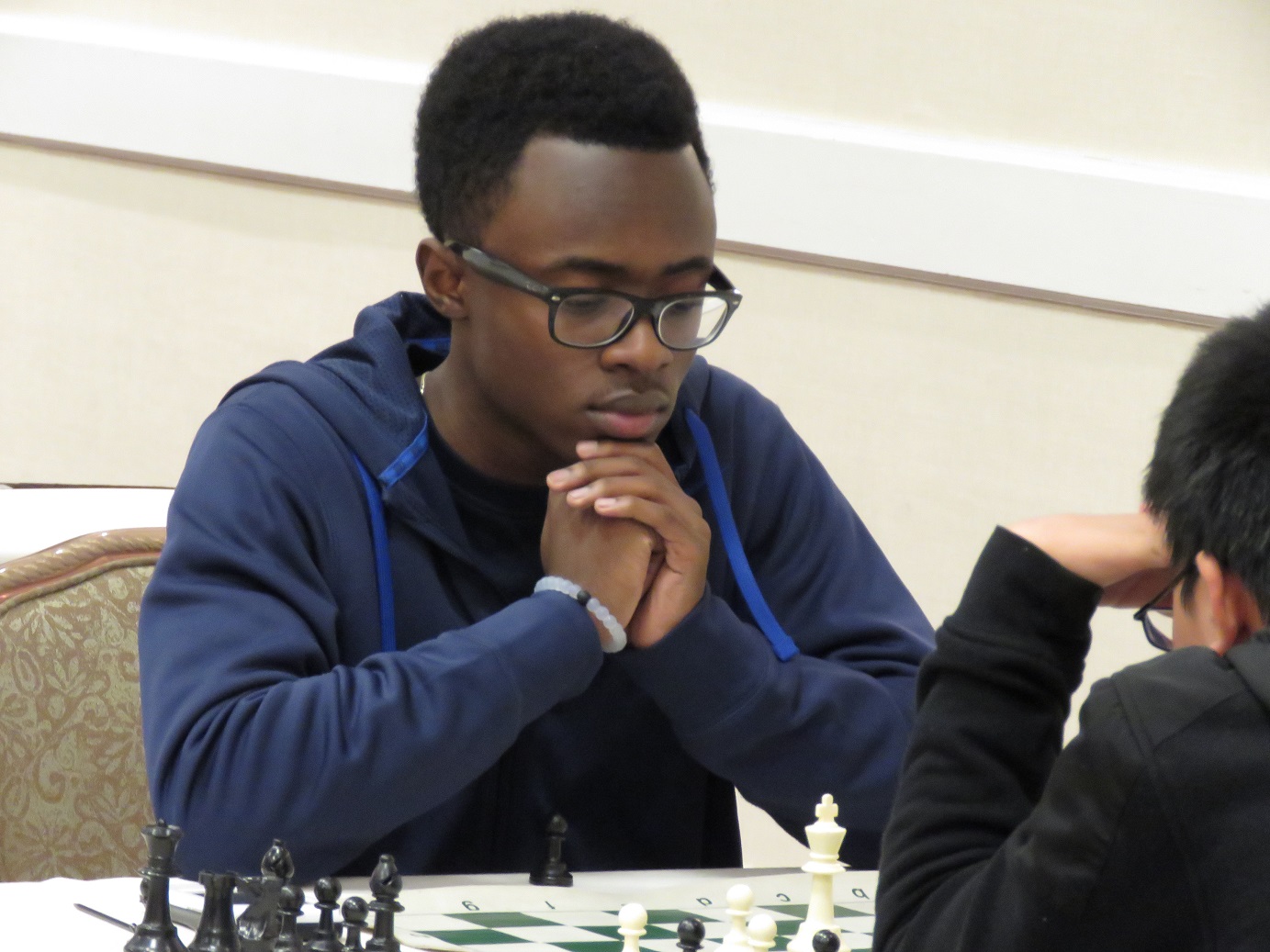
FM Josh Colas at 2015 North American Open drawing with Ruifeng Li. He would earn a GM norm with 6.5/9, but during his stellar performance, cheating allegations were made. The claims were unfounded. Photo by Alan Losoff.
After an investigation determined that no cheating had occurred, they did find that Colas had violated the cell phone policy by forgetting to check his phone. They checked his phone and determined that there was no cheating. He received a warning and time penalty for having his phone. Despite the ruling, the parent tweeted that Colas had been caught cheating. He even told another player whom Colas played (and beat) that he was a cheater. To try to catch someone cheating is one matter, but to follow someone’s 17-year-old child to the bathroom and peer into the stall is a potentially criminal offense.
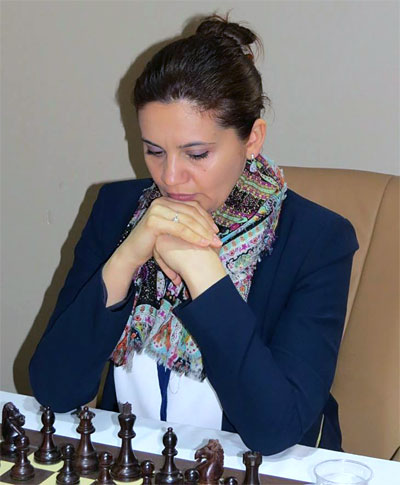
WGM Mihaela Sandu of Romania was also unfairly targeted
at the 2015 European Women’s Championships.
Photo by Frederic Friedel
Another sad case was that of Mihaela Sandu who was on 6/7 at the 2015 European Women’s Chess Championship. After beating Olga Girya, Antoaneta Stefanova, and Aleksandra Goryachkina, rumors were circulating about unfair play. Natalia Zhukova of Ukraine initiated a petition requesting a 15-minute delay due to suspicions of cheating. Thirty-two players signed the initial petition. Sandu continued to win. There was a second petition that mentions Sandu by name and was signed by 15 players.
We, participants of the 16th European Individual Women’s Chess Championship, want to express concern about the situation with M. Sandu’s performance. We would like to ask organizers not to include her games from the rounds 8-11 in a live transmission and publish them after the rounds. We do not see any important reason to dislike this precautionary measure for both sides. We hope that such a decision will prevent all the possible suspicions.
Sandu spent time trying to clear her name instead of preparing for her games. She filed a response, but she lost her next four games. After the investigation, the arbiters found nothing in her play or in her possession that would indicate cheating. After Sandu’s complaint, Zhukova had to serve a three-month suspension imposed by FIDE, despite winning the tournament. There was an appeal that was denied.
So If you suspect, during the play, that your opponent is cheating you may announce this to the arbiter. Arbiter should observe your opponent and may decide to control him. But in case of a false accusation you may be penalized by the arbiter according to the Article 12.2 and 12.9 of the Laws of Chess (from warning to expulsion from the competition).
May 27, 2015
Tournament Director
Giorgi Giorgadze
Shame on all those who accused Mihaela Sandu of cheating. Check the evidence first. This is as harmful for the game as cheating itself.
— Lawrence Trent (@LawrenceTrentIM) May 29, 2015
What Now?
The chess world has been left “hanging” in the aftermath of the controversy. There has been no other information released or statements made to shed light on the issue. It is really pathetic that the chess world spent the better part of two weeks tossing around conspiracy theories. Here is what Alexander Grischuk had to say,
Magnus didn’t freak out for no reason. I got the impression that he was sure Niemann was cheating somehow. There probably was no cheating in their game, their play wasn’t suspicious. Niemann played average, and Carlsen played poorly.
Is cheating at prestigious offline tournaments somehow realistic? That’s what I’m interested in. In online tournaments it’s all about decency. But whether it’s possible to cheat OTB – that’s the question. That’s why I’m waiting for a statement from Magnus: he has to provide at least some facts.
There’s nothing supernatural in the fact that Niemann, playing black pieces, beat Carlsen. It’s understandable that it’s unexpected. Perhaps this game can be compared to soccer: it would be if Barcelona lost to Levante. Rare, but it happens.
~GM Alexander Grischuk
The tragedy in the saga is that there has been no response by FIDE or the Association of Chess Professionals (ACP). Everyone is moving on as if nothing has happened. New tournaments have begun and the issue is still being discussed on social media with new theories purported. It has been a circus. There is no indication that Hans Niemann has contacted the FIDE Ethics Commission or the Association of Chess Professionals. Maybe he is thinking in the long term since he still has his entire career ahead of him.
Neither organization has made an official statement although FIDE Vice President Emil Sutovsky made several independent tweets on the issue. One had to do with the so-called “computer moves” of Niemann.
Some of the accusations (like guessing opening line) are understandable, but claiming Qf3-g3 is a computer move??? Guys, but what else? Nd6? Ne5! Even if one can’t calculate Qg3 dc Bh6, that is the only move to play. pic.twitter.com/oUAt4KDW8K
— Emilchess (@EmilSutovsky) September 8, 2022
So what happens? Do we proceed as if nothing has happened? Will there be stronger measures? Will there be caution about cheating/false accusations? Will there be complaints filed by either party? Both Carlsen and Niemann are scheduled to play in the Julius Baer Generation Cup beginning tomorrow (September 18th) and it will be hard to avoid questions surrounding the controversy. What will Magnus Carlsen say? Will it be “no comment” or will he make a prepared statement? We will soon find out.

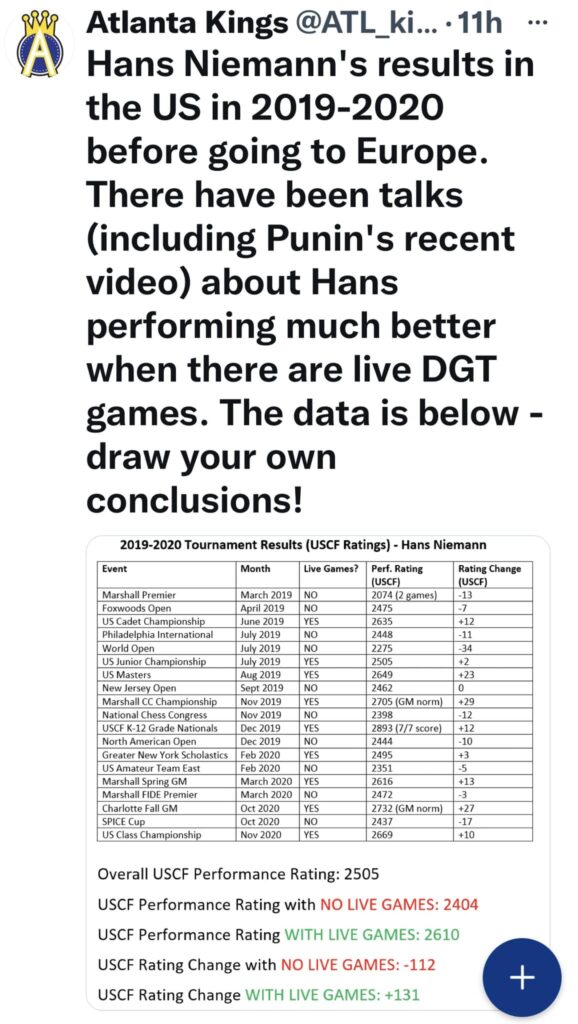
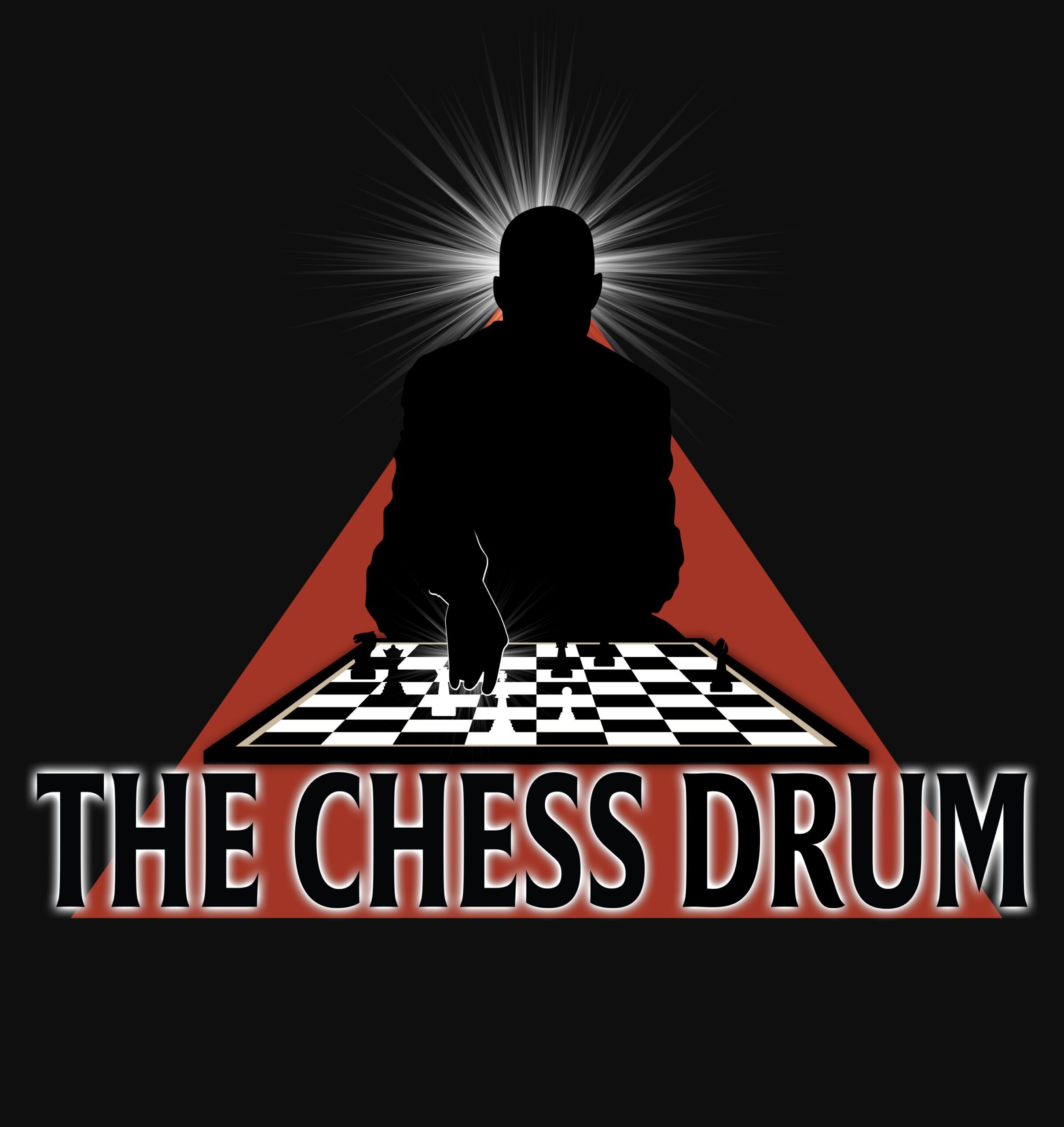
The Chess World Isn’t Ready for a Cheating Scandal
https://www.nytimes.com/2022/09/13/crosswords/hans-niemann-magnus-carlsen-cheating-accusation.html?smid=tw-share
Statement from FIDE – 22 September 2022
FIDE statement on the Carlsen – Niemann polemic
Last week, World Champion Magnus Carlsen resigned in a game played in an online competition against GM Hans Niemann before making his move two. The week before, he left an over-the-board tournament after losing the game to the same Mr. Niemann.
These were not FIDE events; however, as the world’s chess governing body, it is our duty to protect the integrity of the game and its image, and in view that the incident keeps escalating, we find it necessary to take a step forward.
First of all, we strongly believe that the World Champion has a moral responsibility attached to his status, since he is viewed as a global ambassador of the game. His actions impact the reputation of his colleagues, sportive results, and eventually can be damaging to our game. We strongly believe that there were better ways to handle this situation.
At the same time, we share his deep concerns about the damage that cheating brings to chess. FIDE has led the fight against cheating for many years, and we reiterate our zero-tolerance policy toward cheating in any form. Whether it is online or “over the board”, cheating remains cheating. We are strongly committed to this fight, and we have invested in forming a group of specialists to devise sophisticated preventive measures that already apply at top FIDE events.
As we have already done before, FIDE calls for reinforcing the cooperation between major online platforms, private events and top players – most of whom have already expressed their will to join efforts with FIDE.
FIDE is prepared to task its Fair Play commission with a thorough investigation of the incident, when the adequate initial proof is provided, and all parties involved disclose the information at their disposal. We are fully aware that, in some cases, uncertainty can harm players’ performance. It also can be damaging to a player’s reputation – that’s why we insist on the anti-cheating protocols to be followed.
It is our hope that this whole situation could have a long-term positive effect, if tackled properly. We propose to launch a dedicated Panel, that would include representatives of the leading chess platforms, Grandmasters, anti-cheating experts and FIDE officers, in order to fight this risk and prevent it … [from becoming] a real plague.
Arkady Dvorkovich
FIDE President
What does grandmaster Magnus Carlsen’s feud with teen upstart Hans Niemann mean for chess?
https://www.abc.net.au/news/2022-09-20/what-next-for-chess-after-grandmaster-v-upstart-spat/101458482
The Anatomy of Carlsen-Niemann cheating controversy
https://www.thechessdrum.net/blog/2022/10/20/the-anatomy-of-carlsen-niemann-cheating-controversy/